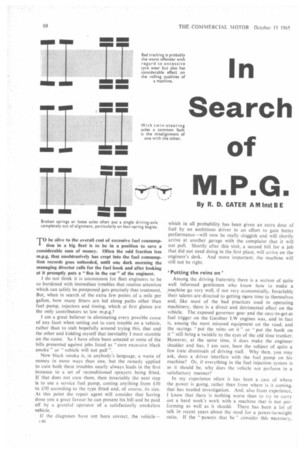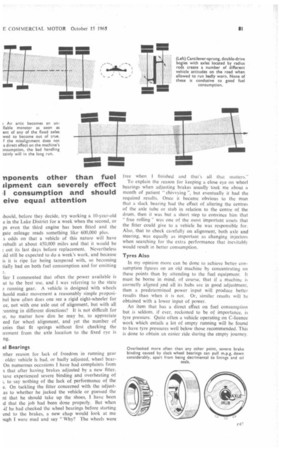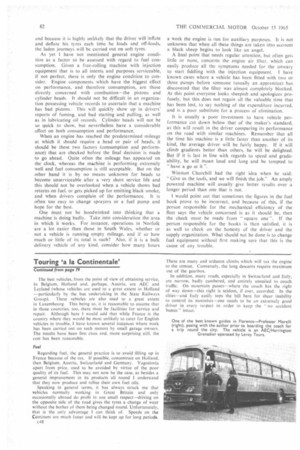In Search of M.P.G.
Page 82

Page 83

Page 84

If you've noticed an error in this article please click here to report it so we can fix it.
By R. D. CATER A M Inst E
'TO be alive to the overall cost of excessive fuel consumpI lion in a big fleet is to be in a position to save a considerable sum of money. Often the odd fraction less m.p.g. that unobtrusively has crept into the fuel consumption records goes unheeded, until one dark morning the managing director calls for the fuel book and after looking at it promptly puts a "flea in the ear" of the engineer.
I do not think it is uncommon for fleet engineers to be so burdened with immediate troubles that routine attention which can safely be postponed gets precisely that treatment. But, when in search of the extra few points of a mile per gallon, how many fitters are led along paths other than fuel pump, injectors and timing, which at first glance are the only contributors to low m.p.g.?
1 am a great believer in eliminating every possible cause of any fault when setting out to cure trouble on a vehicle, rather than to stab hopefully around trying this, that and the other and kidding myself that inevitably I must stumble on the cause. So I have often been amazed at some of the bills presented against jobs listed as "cure excessive black smoke" or " vehicle will not pull ".
Now black smoke is, in anybody's language, a waste of money in more ways than one, but the remedy applied to cure both these troubles nearly always leads in the first instance to a set of reconditioned sprayers being fitted. If that does not cure them, then invariably the next step is to use a service fuel pump, costing anything from £30 to £50 according to the type fitted and, of course, its size. At this point the repair agent will consider that having done you a great favour he can present his bill and be paid off by a grateful operator of a satisfactorily smokeless vehicle.
If the diagnoses have not been correct, the vehicle— i46
which in all probability has been given an extra dose of fuel by an ambitious driver in an effort to gain better performance—will now be really sluggish and will shortly arrive at another garage with the complaint that it will not pull. Shortly after this visit, a second bill for a job that did not need doing in the first place, will arrive on the engineer's desk. And more important, the machine will still not be right.
'Putting the reins on' Among the driving fraternity there is a section of quite well informed gentlemen who know how to make a .machine go very well, if not very economically. Invariably their talents are directed to getting more time to themselves and, like most of the bad practices used in operating machinery, there is a direct and detrimental effect on the vehicle. The exposed governor gear and the easy-to-get-at fuel trigger on the Gardner I.W engines was, and in fact is, among the most misused equipment on the road, and the sayings put the reins on ii" or "put the hook on it" still bring a twinkle to the eyes of the old time trunker. However, at the same time, it does make the engineer shudder and has, I am sure, been the subject of quite a few irate dismissals of driving staff. Why then, you may ask, does a driver interfere with the fuel pump on his machine? Or, if everything in the fuel injection system is as it should be, why does the vehicle not perform in a satisfactory manner?
In my experience often it has been a case of where the power is going, rather than from where is it coming, that has needed investigation. And, also from experience, I know that there is nothing worse than to try to carry out a hard week's work with a machine that is not performing as well as it should. There has been a lot of talk in recent years about the need for a power-to-weight ratio. If the powers that be consider this necessary,
;hould, before they decide, try working a 10-year-old e in the Lake District for a week when the second, or ps even the third engine has been fitted and the gate mileage reads something like600,000 plus.
s odds on that a vehicle of this nature will have rebuilt at about 450,000 miles and that it would be ; out its last days before replacement. Nevertheless ild still be expected to do a week's work, and because is it is ripe for being tampered with, so becoming tially bad on both fuel consumption and for emitting
her I commented that often the power available is ut to the best use, and I was referring to the state ! running gear_ A vehicle is designed with wheels hould make movement a reasonably simple proposibut how often does one see a rigid eight-wheeler for ce, not with one axle out of alignment, but with all -unning in different directions? It is not difficult for re, no matter how dim he may be, to appreciate eed for wheel alignment, and yet the number of anies that fit springs without first checking the rrement from the axle location to the fixed eye is
el Bearings
3ther reason for lack of freedom in running gear older vehicle is bad, or badly adjusted, wheel bearOn numerous occasions I have had complaints from s that after having brakes adjusted by a new fitter, lave experienced severe binding and overheating of to say nothing of the lack of performance of the e. On tackling the fitter concerned with the adjustas to whether he jacked the vehicle or guessed the at that he should take up the shoes, I have been tl that the job had been done properly. But when -if he had checked the wheel bearings before starting end to the brakes, a new chap would took at me augh I were mad and say "Why? The wheels were free when I finished and that's all that matters.
To explain the reason for keeping a close eye on wheel bearings when adjusting brakes usually took me about a month of patient "chivvying ", but eventually it had the required results. Once it became obvious to the man that a slack bearing had the effect of altering the centres of the axle tube or stub in relation to the centre of the drum, then it was but a short step to convince him that "free rolling " was one of the most important assets that the fitter could give to a vehicle he was responsible for. Also, that to check carefully on alignment, both axle arid steering, was equally as important as changing injectors when searching for the extra performance that inevitably would result in better consumption.
Tyres Also In my opinion more can be done to achieve better consumption figures on an old machine by concentrating on these points than by attending to the fuel equipment. it must be borne in mind, of course, that if a machine is correctly aligned and all its hubs are in good adjustment, then a predetermined power input will produce better results than when it is not, Or, similar results will be obtained with a lower input of power.
An item that has a direct effect on fuel consumption but is seldom, if ever, reckoned to be of importance, is tyre pressure. Quite often a vehicle operating on C-licence work which entails a lot of empty running will be found to have tyre pressures well below those recommended. This is done to obtain an easier ride during the empty journey. and because it is highly unlikely that the driver will inflate and deflate his tyres each time he loads and off-loads, the laden journeys will be carried out on soft tyres.
As yet I have not mentioned general engine condition as a factor to be assessed with regard to fuel consumption. Given a free-rolling machine with injection equipment that is to all intents and purposes serviceable, if not perfect, there is only the engine condition to consider. Engine components which have the biggest effect on performance, and therefore consumption, are those directly concerned with combustion—the pistons and cylinder heads. It should not be difficult in an organization possessing vehicle records to ascertain that a machine has bad pistons.. This will quickly show up in drivers' reports of fuming, and bad starting and pulling, as well as in lubricating oil records. Cylinder heads will not be so quick to show, but nevertheless have a considerable effect on both consumption and performance.
When an engine has reached the predetermined mileage at which it should require a head or pair of heads, it should be these two factors (consumption and performance) that are checked before the final decision is made to go ahead. Quite often the mileage has appeared on the clock, whereas the machine is performing extremely well and fuel consumption is still acceptable. But on the other hand it is by no means unknown for heads to become unserviceable after a very short service life and this should not be overlooked when a vehicle shows bad returns on fuel, or gets picked up for emitting black smoke, and when drivers complain of the performance. It is often too easy to change sprayers or a fuel pump and hope for the best.
One must not be hoodwinked into thinking that a machine is doing badly. Take into consideration the area in which it works. For instance, operations in Norfolk are a lot easier than those in South Wales, whether or not a vehicle is running empty mileage, and if so how much or little of its total is such? Also, if it is a bulk delivery vehicle of any kind, consider how many hours a week the engine is run for auxiliary purposes. It is not unknown that when all these things are taken into account a black sheep begins to look like an angel.
A final point that needs regular attention, but often gets little or none, concerns the engine air filter, which can easily produce all the symptoms needed for the unwary to start fiddling with the injection equipment. I have known cases where a vehicle has been fitted with two or three pumps before someone (usually an apprentice) has discovered that the filter was almost completely blocked. At this point everyone looks sheepish and apologizes profusely, but this does not regain all the valuable time that has been lost, to say nothing of the expenditure incurred, and is a poor substitute for a process of elimination.
It is usually a poor investment to have vehicle performance cut down below that of the maker's standard, as this will result in the driver comparing its performance on the road with similar machines. Remember that all the time his machine is a little faster than another of its kind, the average driver will be fairly happy. If it will climb gradients better than others, he will be delighted. But if it is last in line with regards to speed and gradeability, he will Moan loud and long and be tempted to "have a go at it Winston Churchill had the right idea when he said: "Give us the tools, and we will finish the job." An amply powered machine will usually give better results over a longer period than one that is not.
I would point out that sometimes the figures in the fuel book prove to be incorrect, and because of this, if the person responsible for the mechanical efficiency of the fleet says the vehicle concerned is as it should be. then the check must be made from square one If the person responsible for the books is then satisfied, it is as well to check on the honesty of the driver and the supply organization. What should not be done is to change fuel equipment without first making sure that this is the cause of any trouble.








































































































































